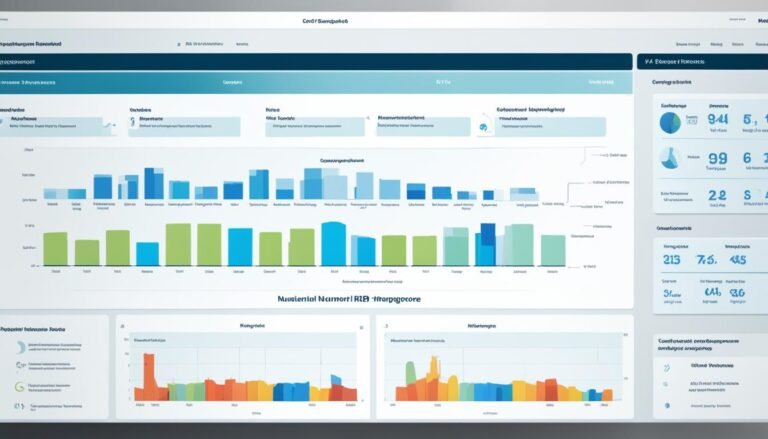A Guide to Human Resources Management Competencies
Human resource management is a rapidly growing career, with projected job growth of 9% from 2014 to 2024. In today’s HR roles, professionals need a broad range of skills and competencies to excel. This comprehensive HR skills list includes key areas such as business management, leadership, human capital development, communication, strategic thinking, and workplace culture development.
Key Takeaways:
- HR professionals require a diverse set of skills and competencies to succeed in their roles.
- Business management and leadership skills are essential for addressing organizational challenges.
- Human capital development involves nurturing talent within the organization through training and mentorship programs.
- Effective communication and interpersonal skills are crucial for HR professionals.
- Strategic thinking and planning skills help HR professionals align people strategies with organizational goals.
Business Management & Leadership Skills
Human resource professionals play a crucial role in addressing various organizational challenges. To excel in their roles, HR professionals need to possess strong business management and leadership skills. These skills enable them to navigate issues related to diversity and inclusion, hiring laws, employee benefits, and organizational culture. HR managers must not only lead but also coach and develop their employees, fostering a culture of growth and success within the organization.
The Importance of HR Leadership Skills
HR leadership skills are vital for guiding an organization towards success. HR professionals need to cultivate an organizational-wide leadership approach, encouraging leaders at all levels to contribute to the organization’s goals and objectives. Effective HR leadership involves building strong relationships, fostering collaboration, and developing problem-solving skills to address personnel issues and challenges effectively.
Managing Organizational Challenges
HR professionals must navigate various organizational challenges ranging from workforce and cultural diversity to hiring laws and regulations. They play a critical role in developing and implementing strategies that promote diversity and inclusion within the workplace. Additionally, HR professionals are responsible for ensuring compliance with hiring laws and regulations, creating fair and inclusive recruitment processes.
Creating and Managing HR Benefit Packages
Employee benefits are an important aspect of HR management. HR professionals need to design and administer comprehensive benefit packages that attract and retain top talent. They must stay informed about industry trends and legal requirements to ensure that their benefit packages align with employees’ needs and expectations. Effective benefit management contributes to employee satisfaction and engagement, enhancing overall organizational performance.
Cultivating a Positive Organizational Culture
Organizational culture is a key driver of employee engagement, productivity, and retention. HR professionals play a crucial role in shaping and fostering a positive workplace culture. They should strive to create an inclusive and inspiring environment that allows employees to thrive. By prioritizing strong organizational culture, HR professionals can boost employee morale, enhance teamwork, and create a cohesive and productive workforce.
Effective HR management requires a diverse set of skills, including business management, leadership, and problem-solving abilities. HR professionals must continuously develop and hone these skills to address the unique challenges they face in the ever-evolving workplace.
Human Capital Development Skills
Human resource managers play a crucial role in human capital development. They are responsible for fostering the growth and development of the workforce, ensuring that employees have the skills and knowledge necessary to contribute to the organization’s success. By investing in workforce development, HR professionals can maximize the potential of their organization’s existing talent and enhance overall performance.
There are several key strategies and initiatives that HR managers can implement to facilitate human capital development:
- Workforce Training and Development: HR professionals can design and implement employee training programs that focus on enhancing specific skills and knowledge. These programs can be structured training programs, workshops, or online courses. By providing the necessary training opportunities, HR managers can empower employees to continually improve their skills and adapt to the evolving needs of the organization.
- Mentorship Programs: Establishing mentorship programs within the organization can facilitate knowledge sharing and skill development. Experienced employees can mentor and guide newer employees, helping them navigate challenges and build their expertise. HR managers can create mentorship programs that pair employees based on their skills and career aspirations.
- Tuition Reimbursement: Offering tuition reimbursement as part of the employee benefits package can encourage employees to pursue higher education and acquire advanced skills. HR managers can develop policies and guidelines for tuition reimbursement, ensuring that employees have the opportunity to enhance their knowledge and qualifications.
Table: Benefits of Human Capital Development
| Benefits | Description |
|---|---|
| Increased Employee Engagement | Employees feel valued and supported, leading to higher job satisfaction and commitment to the organization. |
| Improved Performance | Enhanced skills and knowledge result in improved job performance and productivity. |
| Retention of Top Talent | Investing in the development of employees increases their loyalty to the organization, reducing turnover rates. |
| Adaptability to Change | Continual development ensures that employees can adapt to changes in technology, industry trends, and organizational needs. |
“Investing in human capital development is not just beneficial for the employees, but also for the organization as a whole. By providing opportunities for training, mentorship, and education, HR professionals can cultivate a skilled and engaged workforce that drives organizational success.”
Communication & Interpersonal Skills
Effective communication and interpersonal skills are essential for HR professionals. As the liaison between employees and management, HR professionals need to be able to communicate with individuals at all levels of the organization. Whether it’s delivering important messages, providing feedback, or facilitating discussions, strong communication skills are vital.
HR professionals must also possess exceptional interpersonal skills. Building positive relationships with employees helps foster a harmonious work environment and enhances cooperation and collaboration. Good interpersonal skills enable HR professionals to understand employees’ needs, concerns, and perspectives more effectively.
Conflict management is another crucial aspect of HR’s communication and interpersonal skills. HR professionals need to be skilled at managing conflicts between employees or between employees and management. They should have the ability to mediate disputes, find solutions, and restore harmony in the workplace.
In addition to conflict management, HR professionals often play the role of coaches and mentors. They provide guidance and support to employees, helping them improve their performance, develop new skills, and reach their career goals. By providing coaching and mentorship, HR professionals contribute to the overall growth and development of the workforce.
Having a multicultural worldview is also essential for HR professionals. In today’s diverse workplace, HR professionals need to be able to appreciate and embrace cultural differences. A multicultural worldview helps HR professionals create inclusive policies, practices, and work environments that value diversity.
“Effective communication is the cornerstone of successful HR management. It fosters understanding, builds trust, and supports a positive work culture.”
Key Points:
- HR professionals require strong communication and interpersonal skills.
- Effective communication helps HR professionals deliver messages, provide feedback, and facilitate discussions.
- Interpersonal skills enable HR professionals to build positive relationships and understand employees’ needs.
- Conflict management is a crucial skill for HR professionals, who mediate disputes and restore harmony.
- HR professionals also act as coaches, providing guidance and support to employees.
- A multicultural worldview helps HR professionals create inclusive work environments.
| Communication & Interpersonal Skills | Importance |
|---|---|
| Effective communication | Fosters understanding and builds trust |
| Interpersonal skills | Enhance relationships and promote cooperation |
| Conflict management | Mediates disputes and restores harmony |
| Coaching and mentoring | Guides employee growth and development |
| Multicultural worldview | Promotes inclusivity and values diversity |
Strategic Thinking & Planning Skills
Strategic thinking is a critical capability for HR professionals in today’s dynamic business landscape. By incorporating HR strategic thinking into their practice, HR managers can help their organizations gain a competitive advantage through effective people management. This involves a proactive approach to understanding the organization’s goals and aligning HR initiatives with strategic objectives.
HR managers need to be detail-oriented and skilled at data analysis to make informed decisions. By leveraging HR data-driven decisions, they can identify trends, patterns, and insights that drive organizational success. Data analysis enables HR professionals to identify areas for improvement, make predictions, and develop evidence-based solutions.
HR Planning Skills
HR planning skills are essential for HR managers to align HR strategies with the overall business strategy. By understanding the organization’s current and future workforce needs, HR professionals can devise effective HR plans that support the organization’s growth and sustainability.
These HR planning skills involve evaluating the organization’s talent requirements, identifying skills gaps, and implementing recruitment strategies that attract and retain top talent. HR managers also need to develop HR training and development programs to enhance employee skills and competencies and support career growth.
HR Recruitment Strategies
Developing effective recruitment strategies is a crucial aspect of strategic HR management. HR professionals must identify and implement innovative approaches to attract and hire top talent. This includes utilizing diverse sourcing channels, employing technology-driven selection processes, and cultivating a strong employer brand.
By adopting a strategic approach to recruitment, HR managers can ensure a diverse and inclusive workforce that aligns with the organization’s culture and values. This can contribute to a more positive work environment and better employee performance, ultimately driving organizational success.
HR Training and Development
Investing in employee training and development is vital for organizational growth and success. HR managers need to design and implement comprehensive HR training and development programs that align with the organization’s strategic goals.
These programs should address skills gaps, enhance employee performance, and support career progression. HR professionals should also consider various learning formats, including classroom training, e-learning modules, mentoring, and coaching, to cater to diverse learning preferences.
Through strategic thinking and planning skills, HR professionals can contribute to the long-term success of their organizations. By aligning HR initiatives with business goals, making data-driven decisions, and implementing effective recruitment and training strategies, HR managers can drive organizational growth, enhance employee satisfaction, and build a strong, talented workforce that propels the organization forward.
Workplace Culture Development Skills
Creating a positive workplace culture is a vital responsibility of HR professionals. By fostering a supportive and empowering environment, HR managers can promote employee engagement, development, and overall well-being. Additionally, they play a crucial role in developing leadership within the organization and cultivating a creative and inspiring atmosphere.
Developing a Positive Work Environment
HR professionals need to prioritize creating a positive work environment that fosters collaboration, respect, and open communication. This includes implementing policies and practices that promote work-life balance, diversity and inclusion, and employee recognition.
“A positive work environment is crucial for employee morale and productivity. HR professionals should focus on creating a culture that values employee well-being and promotes a sense of belonging.”
By promoting a positive work environment, HR professionals can ensure that employees feel supported and motivated, leading to increased job satisfaction and retention.
Leadership Development
HR managers should invest in leadership development programs to nurture and cultivate leadership skills within the organization. These programs can include mentoring initiatives, leadership training workshops, and succession planning.
Leadership development not only benefits individuals within the organization but also helps in maintaining a strong leadership pipeline for future growth and success.
Fostering a Creative and Inspiring Environment
HR professionals play a vital role in fostering a creative and inspiring workplace culture. They can encourage innovation by creating spaces and platforms for employees to share ideas, collaborate on projects, and explore new approaches.
By providing opportunities for professional development, allowing time for creativity, and celebrating achievements, HR professionals can foster an environment that encourages employees to think outside the box and contribute their best work.
The image above visually represents the impact of creating a creative and inspiring environment in the workplace. It showcases the power of collaboration and innovation in driving business success.
By focusing on workplace culture development, HR professionals can create a positive and engaging work environment that attracts top talent, boosts employee satisfaction, and contributes to the overall success of the organization.
Developing Skills For Effective Human Resource Management
Developing HR skills is crucial for career advancement in the field of human resource management. HR professionals need to continuously enhance their competencies to stay competitive in the ever-evolving HR landscape. Whether you are starting your career in HR or looking to take your current role to the next level, there are various avenues you can explore to develop your skills and build a strong foundation of knowledge.
HR Credentials and Higher Education
Obtaining HR credentials, such as a degree or certificate in human resource management, can provide you with a solid theoretical framework and practical skills required to excel in the field. Many reputable institutions offer HR programs at both undergraduate and postgraduate levels. These programs cover a range of subjects, including HR strategy, employee relations, recruitment, and organizational behavior. Additionally, pursuing higher education in human resource management demonstrates your commitment to professional development and can make you a competitive candidate for HR positions and promotions.
Continuous Learning and Training
Continuous skills development and training are vital to staying current in the ever-changing HR landscape. As new technologies and trends emerge, HR professionals must adapt and upskill to effectively meet the demands of their roles. There are various training opportunities available, both online and offline, that cater to different HR specializations and skill levels. These training programs can cover topics such as employee engagement, performance management, talent acquisition, and diversity and inclusion. By actively seeking out continuous learning opportunities, you can enhance your HR skills and expand your professional network.
Professional Associations and Networking
Joining professional associations such as the Society for Human Resource Management (SHRM) or the Chartered Institute of Personnel and Development (CIPD) can provide you with access to a wealth of resources and networking opportunities. These associations often offer professional development programs and events where you can learn from industry experts and connect with fellow HR professionals. Actively participating in networking events and engaging with HR communities can help you stay abreast of the latest industry trends, exchange ideas, and gain valuable insights.
Remember, developing your skills in human resource management is an ongoing process. By investing in your professional growth and continuously expanding your knowledge and competencies, you can position yourself as a valuable asset in the HR field.
| Benefits of Skills Development in HR | How to Develop HR Skills |
|---|---|
|
|
Communication Skills
Effective communication is crucial for HR professionals in their interactions with employees, stakeholders, and individuals at different levels of authority. HR communication skills play a vital role in establishing open and transparent lines of communication within an organization.
HR professionals must possess strong written communication skills to effectively convey information and messages. Clear and concise written communication ensures that employees receive accurate and easily understandable information. Additionally, HR professionals often need to develop reports and presentations, where storytelling skills come into play. Through storytelling, they can transform data and information into impactful stories that resonate with their audience.
Personalizing communication and modulating the tone to suit the audience is another important aspect of HR communication. HR professionals need to adapt their communication style to connect with employees, stakeholders, and leaders effectively. By recognizing the needs and preferences of different individuals, HR professionals can cultivate stronger relationships and foster a positive work environment.
“Effective communication is an essential skill for HR professionals. By building strong communication skills, HR professionals can effectively share information, engage with stakeholders, and influence positive change within the organization.”
Table of HR Communication Skills:
| HR Communication Skills | Description |
|---|---|
| HR Written Communication | Ability to write clear and concise messages, reports, and presentations. |
| HR Storytelling | Skills to transform data and information into impactful stories to engage the audience. |
| HR Communication with Stakeholders | Ability to effectively communicate and engage with stakeholders, including executives, managers, and external partners. |
| HR Communication with Employees | Skills to connect with employees at all levels of the organization, including active listening and empathy. |
Administrative Expertise
Although the form of administration is changing with technology, administrative tasks remain crucial for HR professionals. These tasks include handling employee leave, payroll, benefits management, and other administrative duties. Having expertise in HR administration is valuable for HR professionals.
| HR Administrative Tasks | Description |
|---|---|
| Employee Leave | Managing and tracking employee leaves of absence, including vacation time, sick days, and FMLA. |
| Payroll | Processing and managing employee payroll, ensuring accurate calculation of wages, taxes, and deductions. |
| Benefits Management | Overseeing employee benefits programs, including health insurance, retirement plans, and other perks. |
| Other Administrative Duties | Handling paperwork, maintaining employee records, and ensuring compliance with HR policies and regulations. |
HR Management Knowledge and Expertise
Having a strong foundation of HR management knowledge and expertise is essential for HR professionals. In order to excel in their roles, HR professionals need to possess a deep understanding of HR recruitment, selection, absence procedures, and data reporting. This knowledge enables them to effectively handle various HR processes and contribute to the overall success of their organizations.
Furthermore, a background in HR management or psychology can significantly enhance an HR professional’s knowledge and skills in the field. It provides them with the theoretical framework and practical insights needed to navigate the complexities of HR management.
Let’s take a closer look at some key aspects of HR management knowledge and expertise:
HR Recruitment
HR recruitment involves the process of attracting, selecting, and hiring the right individuals for job vacancies within an organization. HR professionals need to have a solid understanding of recruitment strategies, sourcing methods, candidate evaluation techniques, and legal considerations related to the hiring process. By effectively recruiting and selecting suitable candidates, HR professionals contribute to building a talented and diverse workforce.
HR Selection
HR selection is a critical component of the recruitment process. It involves evaluating candidates’ qualifications, skills, and fit for the organization to make informed hiring decisions. HR professionals must be knowledgeable about various selection methods, including interviews, assessments, and reference checks. By employing effective selection techniques, HR professionals ensure that candidates who best align with the organization’s values and requirements are chosen.
HR Absence Procedures
Managing employee absences is an important aspect of HR management. HR professionals need to establish clear absence procedures and policies, including leave entitlements, documentation requirements, and absence tracking systems. By effectively managing employee absences, HR professionals help maintain productivity and ensure fairness in the workplace.
HR Data Reporting
Data reporting is an integral part of HR management. HR professionals must be proficient in collecting, analyzing, and presenting HR data to inform decision-making processes. Whether it’s tracking employee performance, assessing training and development needs, or monitoring diversity and inclusion efforts, HR professionals rely on data to identify trends, measure success, and make data-driven recommendations. Through effective data reporting, HR professionals contribute to the strategic decision-making process within their organizations.
| HR Management Knowledge and Expertise | Key Skills |
|---|---|
| HR Recruitment | – Recruitment strategies – Sourcing methods – Candidate evaluation – Legal considerations |
| HR Selection | – Selection methods – Interviews – Assessments – Reference checks |
| HR Absence Procedures | – Leave entitlements – Documentation requirements – Absence tracking systems |
| HR Data Reporting | – Data collection and analysis – Data presentation – Decision-making processes |
By developing a strong foundation of HR management knowledge and expertise, HR professionals can effectively contribute to their organizations’ HR processes and drive positive change.
Conclusion
Mastering the key competencies and skills in Human Resources Management is essential for success in the field. HR professionals need to continuously develop their skills and stay up to date with the latest trends and best practices. By honing their competencies in areas such as communication, leadership, strategic thinking, and workplace culture development, HR professionals can make a significant impact in their organizations.
Effective communication and interpersonal skills are crucial for HR professionals to build strong relationships with employees and stakeholders. They must be able to convey information clearly, resolve conflicts, and create a respectful and inclusive work environment. Additionally, HR professionals need strong business management and leadership skills to address organizational challenges, develop human capital, and guide their organizations towards success.
Strategic thinking and planning skills are also vital for HR professionals. They must be able to analyze data, think critically, and make informed decisions that align with the organization’s goals. Furthermore, HR professionals play a critical role in shaping workplace culture, creating a positive work environment, and fostering employee engagement and development.
In conclusion, HR professionals who possess the necessary competencies and skills in Human Resources Management can contribute significantly to the success of their organizations. By continuously developing their HR skills and remaining adaptable to change in the field, HR professionals can position themselves as strategic partners and make a positive impact on their organizations’ overall performance.







